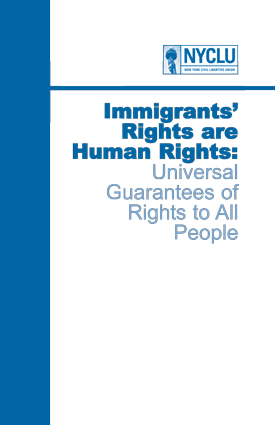Meeting the Moment: The 2024 Civil Rights Agenda for New York
Civil Liberties Union

Over the past 13 years, we have witnessed a series of attacks on the basic rights and freedoms of America’s immigrants. Beginning with the Clinton administration’s support for two far-reaching and punitive immigration reform bills in 1996, and continuing with the Bush administration’s overzealous response to the Sept. 11 attacks, immigrants in the United States have faced assaults on their liberty, dignity and equality. Fortunately, though successive presidents have attempted to undermine immigrants’ rights, there is a growing international movement that recognizes that all persons, regardless of their citizenship status, are guaranteed basic human rights protections. In 1948, the United Nations General Assembly unanimously adopted the Universal Declaration of Human Rights (UDHR), which, for the first time, codified the basic human rights of all people. First Lady Eleanor Roosevelt chaired the U.N. Commission on Human Rights and played a leading role in drafting the Declaration. The UDHR was largely a response to the tragedy of the Holocaust, and was strongly influenced by the U.S. Bill of Rights. It contains 30 articles that detail specific rights that belong to all human beings everywhere, including civil and political rights as well as economic, social and cultural rights. More than 60-years-old, the UDHR is the foundational document of the contemporary human rights movement. Since the adoption of the UDHR by the world community, the United States has ratified a number of human rights treaties, including the International Covenant on Civil and Political Rights, the Convention to End All Forms of Racial Discrimination, and the Convention Against Torture and Other Cruel, Inhuman or Degrading Treatment or Punishment. By ratifying these treaties, the United States has incurred binding international obligations to respect and ensure protection of the human rights recognized in these treaties. In addition, the United States has signed other human rights treaties such as the Convention on the Rights of the Child, the Convention to End All Forms of Discrimination Against Women and the International Covenant on Economic, Social and Cultural Rights, to name but a few. As a signatory to these treaties, the United States has declared it will not do anything to undermine the objectives of these treaties.